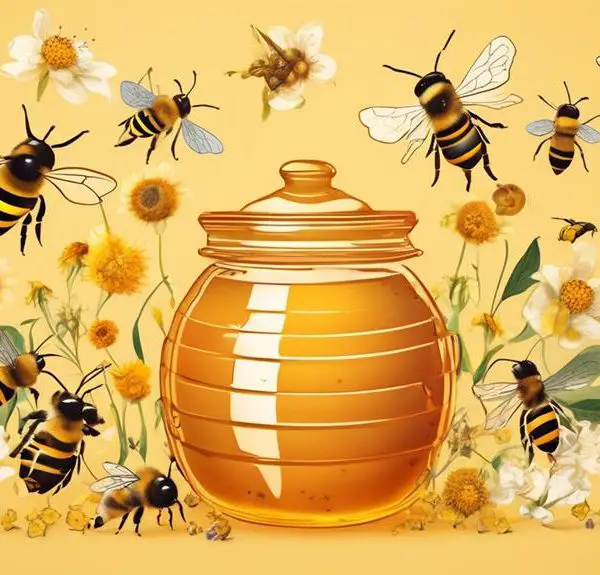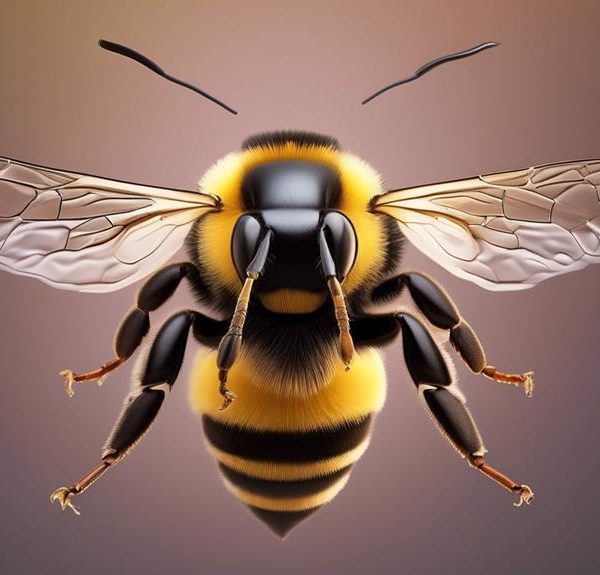Sweet or dangerous? Discover the surprising complexities of feeding honey to birds in this in-depth exploration.
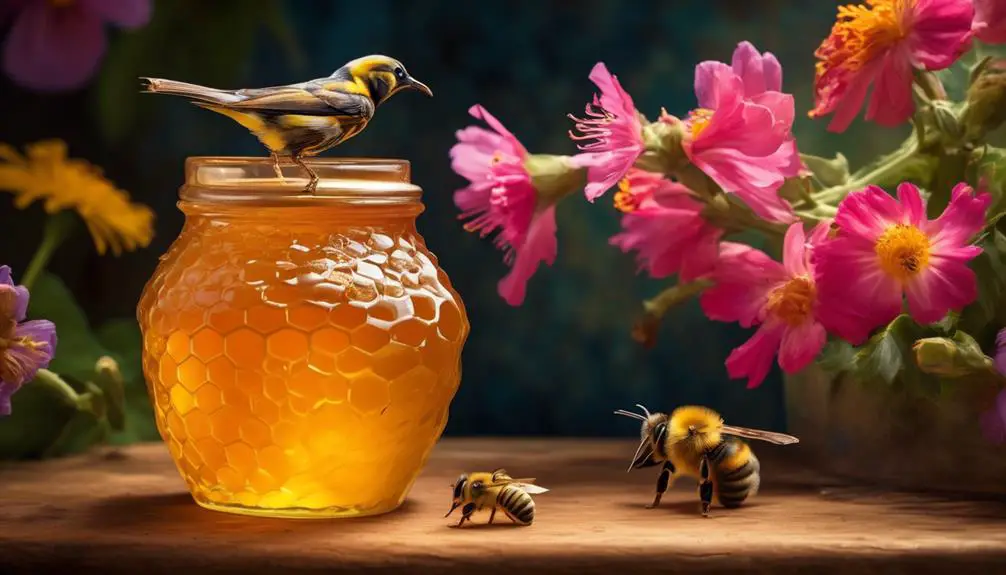
Are Birds Allowed to Eat Honey
Just as you're enjoying a spoonful of honey in your morning tea, a bird pecks at your window, seemingly intrigued by the golden elixir. You've likely never considered whether birds can safely consume honey.
However, it's an interesting question, isn't it? Honey, with its natural sweetness and nutritional profile, seems like it could be an ideal treat for our feathered friends. But the question is not as straightforward as it seems.
There are several factors to consider before you decide to share your honey pot with the birds in your backyard. The potential impact on their health and well-being is something you'll want to explore further.
Key Takeaways
- Birds have diverse dietary needs based on species, size, and habitat.
- Honey can pose risks to birds due to its high sugar content and potential bacterial and fungal contamination.
- Safe honey consumption for birds involves considering the quality, processing, and moderation of honey.
- Understanding a bird's natural diet is essential before introducing honey as a food source.
Understanding Bird Diets
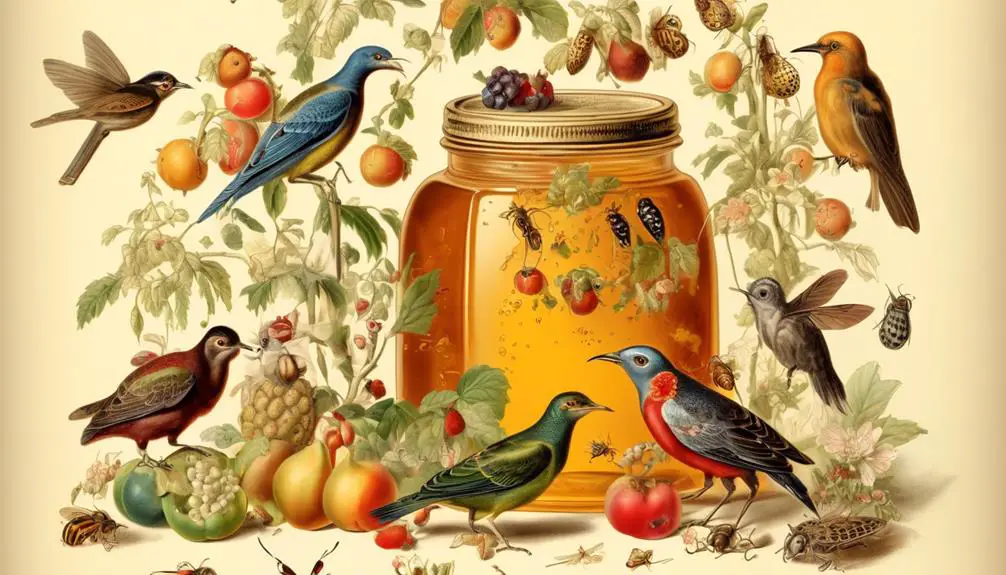
To fully grasp why honey may or may not be suitable for birds, it's crucial to first understand the intricacies of bird diets. Birds, like humans, require a balanced diet to maintain overall health. This typically comprises proteins, carbohydrates, fats, vitamins, and minerals. Each species of bird has a unique dietary pattern that's influenced by factors such as size, habitat, and life stage.
For instance, hummingbirds primarily feed on nectar due to their high metabolic rate, which demands a rapid source of energy. In contrast, birds of prey like hawks and eagles are carnivorous, consuming a diet rich in proteins and fats obtained from small mammals. Seed-eating birds like sparrows and finches extract their nutrients from a variety of grains.
The diversity in bird diets points to the importance of specific nutrients for each bird species and their health. It's not about merely filling their stomachs, but ensuring they receive the right nutrients in appropriate proportions. Therefore, when considering whether to add honey or any other food into a bird's diet, one must consider its nutritional value and how it fits into the bird's specific dietary needs.
Nutritional Profile of Honey
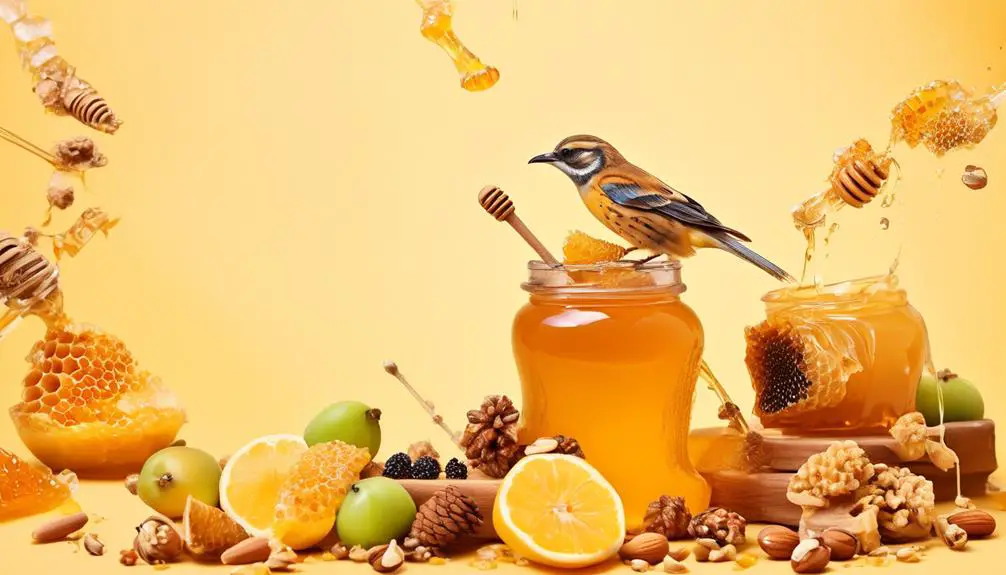
Delving into the nutritional profile of honey, you'll find it's a rich source of sugars, primarily fructose and glucose, along with trace amounts of vitamins, minerals, and antioxidants. Consumed in moderation, honey can provide energy and essential nutrients.
Here's a breakdown:
Nutrient | Quantity per 100g | Benefits |
|---|---|---|
Sugars | 82.4g | Provide quick energy |
Dietary Fiber | 0.2g | Aids in digestion |
Vitamins | Trace amounts | Necessary for various body functions |
Minerals | Trace amounts | Crucial for bone health, fluid balance |
Antioxidants | Present | Reduce oxidative stress |
These components make honey a high-energy food. However, it's noteworthy that despite its benefits, honey also contains high fructose levels, which can be potentially harmful if consumed excessively. Fructose is a simple sugar that birds can metabolize, but too much can lead to health issues.
In the context of bird nutrition, honey can be a treat, but it shouldn't replace a balanced diet. The best approach is to offer honey sparingly, ensuring your feathered friends get a variety of nutrients from diverse food sources. Understanding honey's nutritional profile can help you make informed feeding decisions.
Potential Risks of Honey for Birds
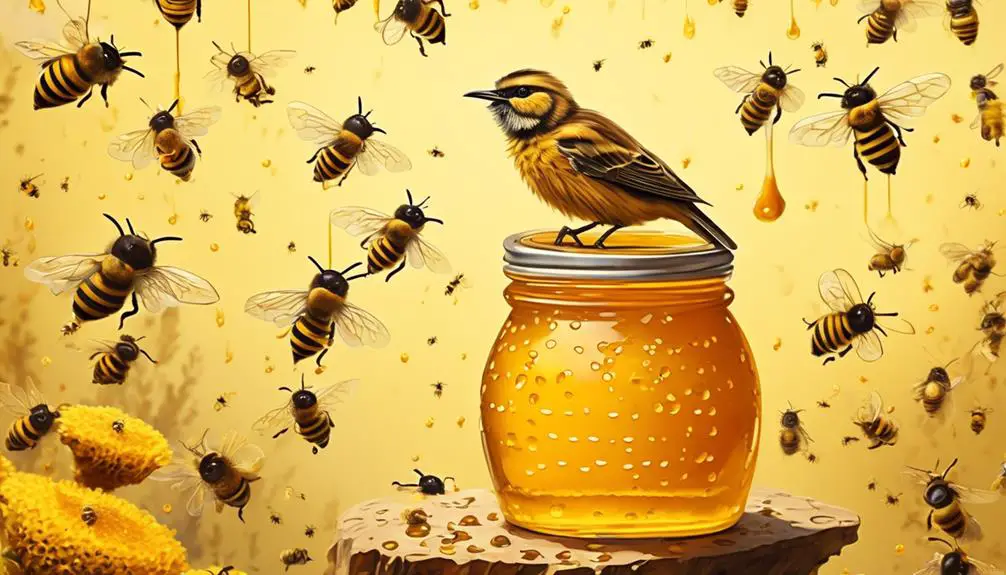
While understanding the nutritional profile of honey can guide you in feeding your birds, it's equally important to consider the potential risks associated with honey consumption. The high sugar content in honey, for example, can lead to obesity and related health issues in birds, especially if consumed in large quantities or as a primary food source.
Furthermore, honey, particularly raw or unprocessed honey, may harbor harmful bacteria such as Clostridium botulinum, which can cause botulism—a serious, potentially fatal illness in birds. Botulism toxin can lead to progressive paralysis and even death in birds.
Another risk is the potential for honey to carry various fungi, which can result in fungal infections in birds. Such infections can damage a bird's digestive system, impairing its ability to absorb nutrients from food.
Lastly, the sticky nature of honey can cause problems too. It can mat the feathers of birds, impacting their ability to fly and regulate body temperature.
Safe Honey Consumption for Birds
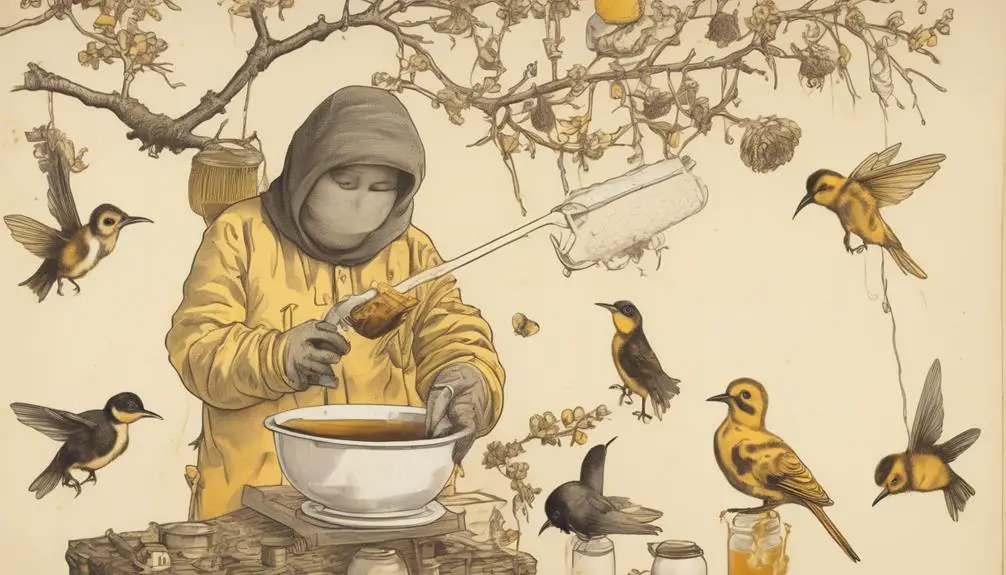
Despite these risks, your feathered friend's safe consumption of honey can be ensured with a few careful considerations and precautions. It's crucial to remember that not all honey is created equal, and the source, processing method, and quality of honey can significantly impact its safety for birds.
Here is a table summarizing the key factors to consider:
Factor | Description | Implication |
|---|---|---|
Source | Honey from wild flowers can contain traces of toxins | Choose honey from trusted producers |
Processing | Raw, unfiltered honey may contain harmful bacteria | Opt for filtered, pasteurized honey |
Quality | High-quality honey is less likely to contain impurities | Invest in good quality honey |
Regular vet check-ups are also essential to monitor your bird's health status. While honey can be a nutritious treat, it should be given in moderation due to its high sugar content. Your bird's diet should primarily consist of species-specific feed, fruits, and vegetables.
Case Studies: Birds and Honey
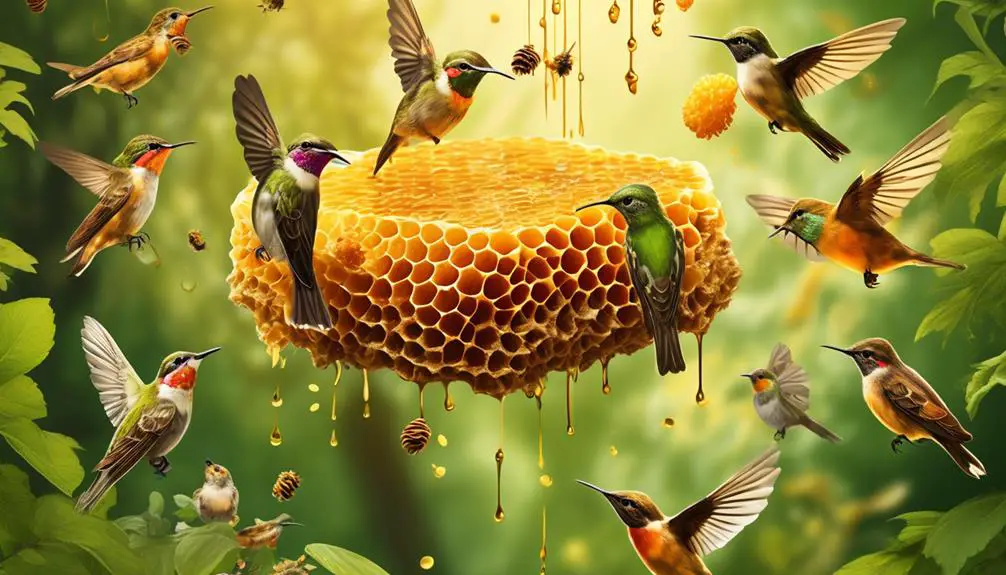
In the realm of ornithology, there are several fascinating case studies that highlight the intricate relationship between birds and honey, providing deeper insights into their dietary preferences and survival strategies. Take, for instance, the New Zealand Bellbird. You'll find that this species derives nearly 90% of its diet from nectar, including honey. Their long, curved beaks and brush-tipped tongues have evolved specifically for this purpose.
Another species worth noting is the Honeyguide bird, native to Africa. It's known for leading humans to wild beehives, and in return, it feasts on the honey left behind. This unique symbiotic relationship serves as a testament to its dietary reliance on honey.
However, not all birds are designed to consume honey. The North American hummingbird, despite its love for nectar, can suffer from a fungal infection if it ingests honey. This is due to the high spore content often found in raw honey.
These examples illustrate that while some birds have evolved to consume honey as a primary food source, others can't handle it due to their physiological limitations. Therefore, it's essential to understand a bird's specific dietary needs before offering them honey.
Conclusion
So, can birds eat honey? Yes, they can, but in moderation. While honey provides certain nutrients, it's not a natural part of a bird's diet. Too much can lead to health problems like obesity and diabetes.
It's best to offer them a variety of fresh fruits and vegetables instead. And remember, not all birds react the same way to honey. Always monitor your feathered friend's response to any new food.

